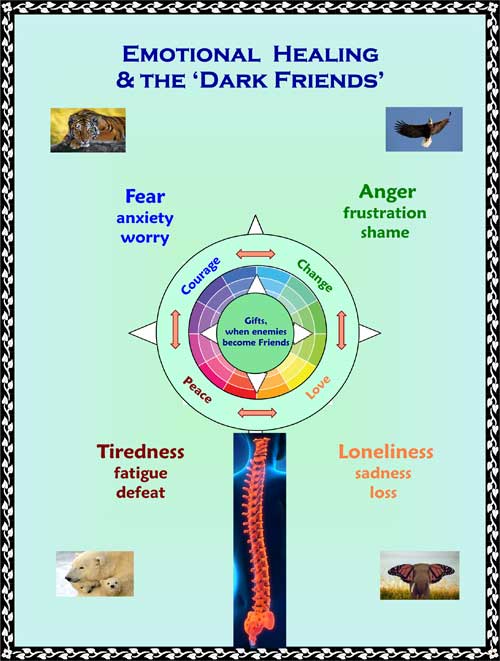
|
|
|
||
| Our Pages ABOUT CONSTITUTIONAL MEDICINE
|
There are four terribly hard feelings that all of us must experience in life to at least some degree. They are fear, loneliness, exhaustion and anger. Fear, usually called anxiety, is a huge issue for many people and, as it is something that comes up a great deal in practice, it is written about in some depth here Loneliness, which has a great deal in common with, and in many ways is another word for depression, or sadness, is talked about here Exhaustion is a common theme, especially in any kind of chronic illness, and is written about here But anger, or as it commonly described with words such as 'irritability, frustration, grumpiness, short-fused, moody' etc.is in a whole class of its own. For a start, these words are only pointers, never the thing itself. A more descriptive word could be to call it a 'fire'. For that is how anger feels, it is fiery, intense, painful. It is capable of doing extraordinary harm. It is something that is extremely difficult to be near to. It is also very difficult for us to talk about anger in a way that 'owns it' in any kind of useful way. Most of us are deeply conditioned, from very young, to harshly judge our 'fire'. We learn to control it, or at least not to show it, and when we fail in this, we are made to feel shame. Initially by our parents, teachers, siblings etc. soon enough by ourselves. The other pages linked just above all have detailed articles on them, including herbal and other general strategies that may help. This article is different (and much shorter!) The fire of anger happens for a reason, always. If we live or work with others, we will have cause for it. If we have a body that is aging and less than perfect, we will have cause for it. If we have any amount of sensitivity to the world, we will have cause for it. There are innumerable reasons for the fire to kindle and grow, but a most crucial point to understand is that, even when we cannot see it or feel it, this fire is a always there within us, a part of us that we cannot get rid of, and nor should we be trying to. The intention of this introductory page and what follows from it, is not to help a person stop getting angry. Aside from that this would be a mission doomed to failure whilst they still lived, it would not be a wise endeavour either. We get angry because there are things in our lives that we don't like and that we need to either change or change our reactions to. At the very least, we need to give our attention to them. People always get angry for a reason. Another person, or we ourselves, can think or say that 'he or she shouldn't get angry about x, y or z' but the judgement on it makes no difference. The fire is there anyway, whatever caused it to flare up is what it is too. In any case, anger is not the enemy we have made it to be. It is the way we deal with it, the way we channel and use our 'fire' that is the problem. The intention here is to encourage a person to look at this subject from a completely different point of view, namely to approach our innate 'fire' as a kind of 'dark friend' that we need to get closer to, to learn how to better be with it, to not try to get rid of it but rather allow it to show us how to make some necessary changes in our lives, especially within ourselves. These are not easy matters to grasp at a practical, useful level and this is not an easy subject to put into words but, if what has been said so far has resonated enough with you to want to delve into it further, then there are two further articles that take it to the next steps The first is for the person who has come to this page primarily because they are having trouble with an angry person in their lives, and they would like to help them or improve their relationship with them. There is a technique called active listening that has been consistently seen to be remarkably effective in this area that is described in practical detail here In fact, it is much easier to help another with their anger than it is for us to come to terms with, and work with, our own. To that purpose, there is also an extensive chapter on emotional healing on this site that goes a lot further into this idea of our anger being a kind of 'dark friend', something we need to change our relationship with in order for there to be a lasting change, even a transformation. The introduction page to that section starts here
Please understand that I cannot personally advise you without seeing you in my clinic. |
|
|
|
© 2011 R.J.Whelan Ltd
